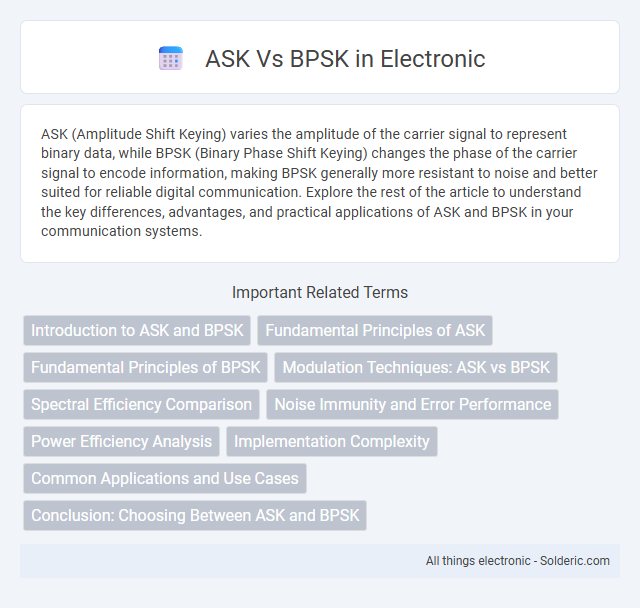ASK (Amplitude Shift Keying) varies the amplitude of the carrier signal to represent binary data, while BPSK (Binary Phase Shift Keying) changes the phase of the carrier signal to encode information, making BPSK generally more resistant to noise and better suited for reliable digital communication. Explore the rest of the article to understand the key differences, advantages, and practical applications of ASK and BPSK in your communication systems.
Comparison Table
| Aspect | ASK (Amplitude Shift Keying) | BPSK (Binary Phase Shift Keying) |
|---|---|---|
| Modulation Type | Amplitude modulation | Phase modulation |
| Signal Change | Amplitude toggles between high and low | Phase shifts by 180 degrees |
| Bandwidth Efficiency | Moderate | High |
| Noise Immunity | Low (susceptible to amplitude noise) | High (better phase noise resilience) |
| Power Efficiency | Lower | Higher |
| Complexity | Simple transmitter and receiver design | More complex receiver design |
| Use Cases | Low-cost, short distance communication | Robust digital communication systems |
| Error Performance | Higher BER in noisy environments | Lower BER, better error performance |
Introduction to ASK and BPSK
Amplitude Shift Keying (ASK) and Binary Phase Shift Keying (BPSK) are fundamental digital modulation techniques used in communication systems. ASK modulates the amplitude of a carrier signal to represent binary data, making it sensitive to noise and amplitude fluctuations. BPSK, on the other hand, varies the phase of the carrier signal to convey information, providing better noise immunity and error performance compared to ASK, which benefits your system's reliability in digital transmission.
Fundamental Principles of ASK
Amplitude Shift Keying (ASK) modulates data by varying the amplitude of the carrier signal, representing binary values through different amplitude levels. A higher amplitude typically denotes a binary '1', while a lower or zero amplitude represents a binary '0', making ASK a form of amplitude modulation tailored for digital data transmission. This fundamental principle enables ASK to efficiently convey digital information over analog channels while being sensitive to noise and amplitude distortion.
Fundamental Principles of BPSK
BPSK (Binary Phase Shift Keying) modulates the phase of a carrier signal by shifting it between two distinct phases, typically 0deg and 180deg, representing binary digits 0 and 1. Unlike ASK (Amplitude Shift Keying), which varies the carrier amplitude, BPSK offers enhanced noise immunity and spectral efficiency by maintaining constant amplitude and only altering phase. This fundamental phase modulation principle allows BPSK to achieve lower bit error rates in communication systems, making it ideal for digital data transmission over noisy channels.
Modulation Techniques: ASK vs BPSK
Amplitude Shift Keying (ASK) modulates the amplitude of a carrier signal to represent data, making it simpler but more susceptible to noise and amplitude variations. Binary Phase Shift Keying (BPSK) encodes data by shifting the phase of the carrier signal 180 degrees, providing greater noise immunity and better performance in low signal-to-noise ratio environments. Your choice between ASK and BPSK should consider the trade-off between implementation complexity and resilience to interference.
Spectral Efficiency Comparison
ASK (Amplitude Shift Keying) generally has lower spectral efficiency compared to BPSK (Binary Phase Shift Keying) due to its susceptibility to noise and less optimal use of bandwidth. BPSK, with phase modulation, provides better noise immunity and allows more reliable data transmission within the same spectral bandwidth. Consequently, BPSK achieves higher spectral efficiency by maintaining robust performance at lower signal-to-noise ratios, making it preferable in bandwidth-constrained communication systems.
Noise Immunity and Error Performance
BPSK (Binary Phase Shift Keying) offers superior noise immunity compared to ASK (Amplitude Shift Keying) because its information is conveyed through phase changes rather than amplitude variations, which are more susceptible to noise interference. The error performance of BPSK is significantly better, exhibiting a lower bit error rate (BER) under identical signal-to-noise ratio (SNR) conditions, making it a preferred choice in noisy communication environments. For your communication system, choosing BPSK can enhance reliability and reduce errors in signal transmission.
Power Efficiency Analysis
Amplitude Shift Keying (ASK) exhibits lower power efficiency compared to Binary Phase Shift Keying (BPSK) because ASK signals fluctuate in amplitude, leading to higher susceptibility to noise and increased bit error rates under identical power conditions. BPSK maintains constant signal amplitude with phase variations, enabling more reliable data transmission and improved energy utilization, especially in noisy communication channels. Power efficiency metrics demonstrate that BPSK achieves better bit error rate performance per unit of transmitted power, making it preferable for power-constrained wireless systems.
Implementation Complexity
ASK (Amplitude Shift Keying) features simpler implementation with easy modulation and demodulation techniques due to amplitude variation, making it cost-effective for basic communication systems. BPSK (Binary Phase Shift Keying) requires more complex phase detection and synchronization circuits, increasing implementation complexity but offering better noise immunity. Your choice depends on balancing system complexity and performance requirements, with ASK suited for straightforward setups and BPSK preferred for robust data transmission.
Common Applications and Use Cases
ASK (Amplitude Shift Keying) is commonly used in optical fiber communication and low-bandwidth RF systems due to its simple implementation and cost-effectiveness. BPSK (Binary Phase Shift Keying) finds extensive application in satellite communication, Bluetooth, and Wi-Fi systems where higher noise immunity and robust data integrity are crucial. Both modulation schemes play vital roles in digital communication, with BPSK favored in environments demanding better performance under interference.
Conclusion: Choosing Between ASK and BPSK
Choosing between ASK and BPSK depends on your specific communication needs; BPSK offers better noise immunity and error performance in noisy environments due to its phase modulation, while ASK provides simpler implementation and lower cost by modulating signal amplitude. For applications requiring robust data transmission and reliability, BPSK is the optimal choice. If system simplicity and cost-efficiency are priorities in less noisy channels, ASK might be more suitable.
ASK vs BPSK Infographic

 solderic.com
solderic.com